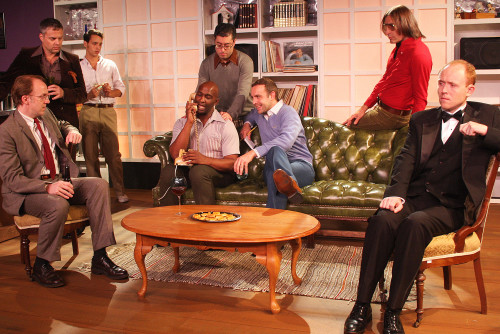
Bob Mussett, Gene Dante, Diego Buscaglia. Mikey DiLoreto; Damon Singletary, Victor Shopov, Ryan Landry, and Brooks Reeves. Photo by Richard Hall/Silverline Images
When it first opened off-Broadway in 1968, THE BOYS IN THE BAND must have been shocking with its scenes of gay men kissing and its subject matter so baldly exposed. Almost 50 years later, the subject matter is practically quaint. Now that’s shocking. THE BOYS IN THE BAND is a classic in the annals of American Theater, pre-dating the ground-breaking Stonewall riots, serving up a cast of homosexual characters, a template of gay issues, and influencing generations of playwrights creating work about the gay experience. Zeitgeist Stage Company’s season opener features outstanding work by some of our best actors, who live and breathe these roles.
Written by Mart Crowley, who also wrote the screenplay for the 1970 film featuring members of the original theatrical run, THE BOYS IN THE BAND are nine gay men, variously closeted, who show up for a birthday party at a perfectly appointed NYC apartment. As the play opens, Victor Shopov as party host Michael, is readying his pad, and deftly working his way through some pretty dense monologues illuminating his background as a lapsed Catholic and recovering alcoholic. Before the evening is over he will have fleshed out all the anxiety, fear, rage and finally self-hatred born of his trapped circumstances and the absorption of a prejudiced society’s values. It’s a terrific performance.
Michael is currently involved with the beautiful Donald played with great ease and appeal by Diego Buscaglia, and together they greet their guests: the “flamboyantly” flamboyant interior decorator Emory played all out by Mikey DiLoreto and his lover the gentle Bernard, Damon Singletary, whose performance culminates in a heartbreaking phone call in ACT II. Gene Dante is perfect as the promiscuous Larry who arrives with his partner Hank, Bob Mussett, a suit-and-tie wearing school teacher on the verge of divorce; nothing about him overtly says “gay.” The opposite is true of the extravagantly stupid rhinestone cowboy hilariously played by Richard Wingert, who has been delivered to the apartment as a “gift” for Harold the birthday boy.
Gold Dust Orphan Ryan Landry (whose work speaks for itself) in a rare dramatic role as the aforementioned Harold uses his considerable comedic skills-bitter wit and dyspeptic commentary– to leaven his surprisingly considerable dramatic skills. He makes his entrance just as a fight breaks out at the end of Act I precipitated by the unexpected arrival of Michael’s supposedly straight college roommate from Georgetown, Alan. Alan is clearly in crisis and Brooks Reeves is the living, breathing manifestation of a man on the edge of knowing and not knowing who he is. As Alan gradually absorbs the gay milieu in which he finds himself, he almost appears to implode from the restrained intensity of his performance.
The play creeks a bit structurally and trots out all the stereotypes in this self-described “freak show,” with its colorful continuum of gay types and liaisons. So we have the closeted married gay man, the gay man who can’t keep it in his pants, the effeminately over the top queen, the dumb gay hustler, the black gay man, the sardonic gay man who hates himself, and of course the pillar of the community gay man who is closeted to himself. Each man tells the story of when he first “knew.” The engine of the play creeks a bit too– why would any of these characters agree to play that painfully revelatory party game Michael forces on them, and why would Alan STAY? The play doesn’t convincingly justify his remaining there.
But this production keeps the drama both compelling and enlightening, and these performances along with David Miller’s direction keeps it loose. To those who object to the play’s being dated, I say, thank goodness; “dated” means “progress.” What is NOT dated here is the universality of the issues faced by these characters who have struggled to simultaneously hide and be comfortable with who they are. That the production allows us to see these issues of identity for gay men in a larger, universal context is laudable and crucial if people are ever to stop being marginalized. Who isn’t struggling with identity? I look forward to the day when we no longer have “gay” plays, “black” plays, “chick flicks,” etc. THE BOYS IN THE BAND was a landmark step in that direction and changed the zeitgeist; this production continues the momentum by providing an ongoing reminder of where we’ve been so we can keep on moving forward.
See THE BOYS IN THE BAND at the aptly named Zeitgeist Stage Company through October 3!


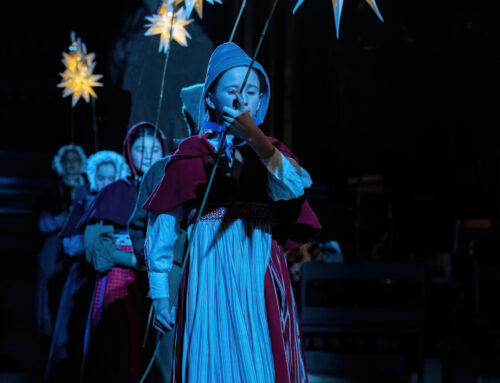
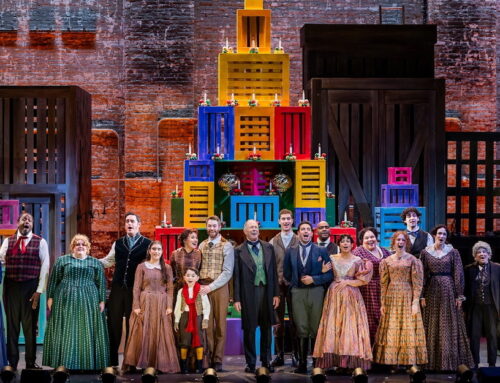
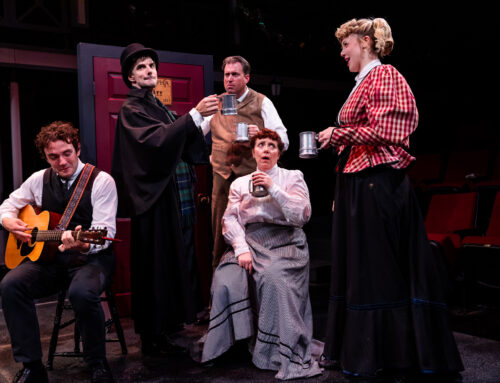
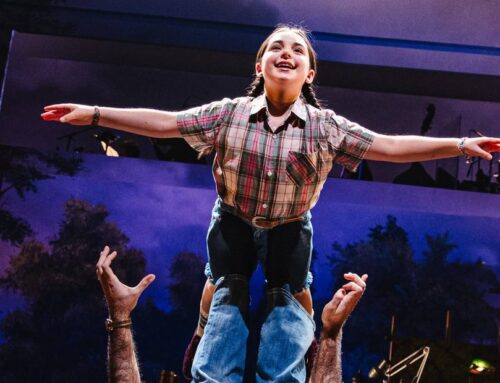
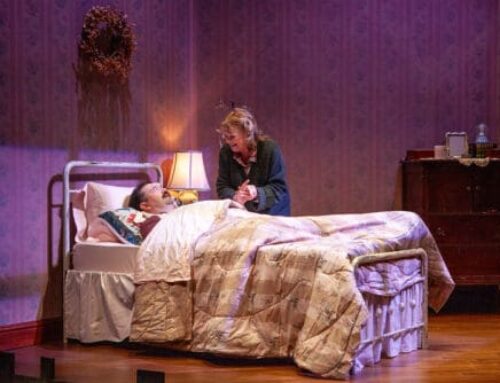
[…] Kulhawik looks at THE BOYS IN THE BAND and EARNEST SHACKELTON LOVES […]